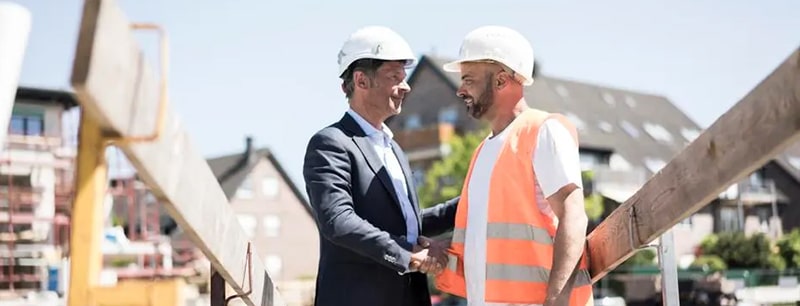
What to expect from an owners representative
In the world of the construction industry, there are many moving parts and components when conducting a project. Whether you are having commercial or residential construction work conducted, you may have heard of an owner’s representative. The owner’s representative looks out for the owner’s interests, serving as a liaison to correctly complete the vision and objectives throughout the journey of your construction project.
Their expertise, diligence, and strategic acumen are indispensable in achieving successful project outcomes amidst the dynamic landscape of construction and development endeavors. In this article, we will discuss an owner’s representative, what their responsibilities consist of, and the skills utilized to make a successful representative. By the end of this article, you will be able to consider yourself an expert on the topic of owner’s representatives in the construction industry. You can also learn more about Owners Representatives by visiting the section on our services page.
What is an owner’s representative?
In construction, an owner’s representative is an individual or company who serves as a client’s representative for a property owner or property management company. They serve a multitude of responsibilities and tasks to ensure the goals and objectives of the owner are being met during a construction project.
A purpose for utilizing a representative is to alleviate much of the responsibility and task associated with managing a construction project onto the representative to handle. From this article, we will discuss what role and purpose an owner’s representative serves, the oversight they offer when managing a construction project, the level of communication skills required to succeed, managing your budget and managing the scheduling of your project, and utilizing conflict management skills and providing beneficial resolutions.
What is the role of an owner’s representative?
Besides the previous tasks and responsibilities mentioned above, an owner’s representative encompasses many unique tasks.
An owner’s representative serves as the client’s representative; they serve all of the needs and goals of the client for their construction project. They work as a customer liaison handling any of the issues the client has for the construction project and any information they need from any other parties such as architects, contractors, and subcontractors. As an owner’s representative, it is imperative they are in line with the client’s goals, budget, and scheduling for the project deadline. They will be the primary contact and person responsible for the construction project from start to finish. A lot of the work involves:
Maintaining constant communication with other parties and the client
- Management of the project and necessary deadlines
- Delivering information in a documentation manner by providing memos to parties such as the board of directors of the ongoing project and any pending tasks
- Scheduling of meetings, agendas, and daily report logs
- Preparation of scheduling of orders on materials and payment applications
With a focus on protecting the client’s interests and maintaining project quality, an owner’s representative plays a crucial role in facilitating effective communication and collaboration among all parties involved in the construction process.
By utilizing their expertise in the construction management process, they are essentially playing a crucial role in determining the level of success of your construction project whether it’s commercial or residential. Their comprehensive understanding of the intricacies of construction projects enables them to anticipate challenges, implement solutions, and ensure that the project is delivered to the client’s satisfaction, on time, and within budget.
The oversight of a owner’s representative
The owner’s representative provides a watchful eye over the duration of the construction project. Every aspect of the project, the representative is informed and knowledgeable about. Monitoring the project is a huge aspect of their role as they ensure alignment with predetermined objectives and milestones.
In addition to providing a watchful eye, an owner’s representative can offer quality control throughout the project lifetime. They will be responsible for conducting routine inspections, reviewing the work conducted by the employees at the construction site, and ensuring that safety and regulatory compliance requirements are followed. It is a role where the individual must be very detail oriented and minimize any mistakes made.
How effective is their communication
When trying to find the right owner’s representative for your construction project, you want to ensure communication is one of their strong suits. How effective they communicate with the client and all other stakeholders involved will determine the level of success for the project.
They are responsible for communicating and serving as the sole coordinator for the project. Not only are they communicating with the client but also all subcontractors involved in the project.
Moreover, an owner’s representative leverages a variety of communication channels and technologies to facilitate efficient information flow and collaboration. From traditional methods such as meetings, emails, and phone calls to modern digital platforms such as project management software, collaborative tools, and online portals, they employ a diverse array of communication mediums to accommodate different communication preferences and ensure accessibility and inclusivity. Additionally, they establish clear guidelines for information dissemination, outlining protocols for document sharing, reporting, and decision-making processes to streamline communication workflows and mitigate the risk of information silos or miscommunication.
Furthermore, an owner’s representative fosters a culture of transparency and accountability by promoting open communication and regular updates. They establish communication cadences and reporting mechanisms to ensure that stakeholders receive timely updates on project progress, milestones, risks, and issues. By fostering a culture of transparency and accountability, they cultivate trust and confidence among stakeholders, facilitating collaboration, alignment, and ultimately, project success. Through effective communication protocols, an owner’s representative lays the foundation for seamless information flow, fostering collaboration, and driving project success.
Management of the budget costs and schedule
Two takeaways from this topic include maximizing the client’s investment and steering clear from any unnecessary costs during the construction project. One of the main areas of the role consists of management of the project and the budget. Close communication and collaboration will be involved directly with the building owner or manager to ensure the cost for materials, labor, repairs, and any other associated costs are managed effectively. It is important to have open communication and conversations regarding a practical and sensible budget.
Furthermore, in the construction industry, ongoing changes during the construction and renovation process are a common theme. It is important to educate your client on any ongoing changes which may occur. You should also look for opportunities to serve your client and mitigate any costful finances during the process.
Budgeting will always go hand in hand with scheduling of your project. In the construction industry, costs may arise at any moment. For example, if additional materials are required for a project or more labor is needed, the costs for the project will certainly increase. This is why it’s best to utilize a proactive management approach to ensure the project is completed on time and perceive any delays.
Strategizing your schedule management plan
So, how do you ensure your success and your project as an owner’s representative? You can accomplish this by managing your time and your scheduling of the project. As an owner’s representative, it is incredibly imperative that you schedule every part of your project as an outline to be followed. If any changes or bumps in the road come along the way, it is important to update your scheduled plan for the construction project and readjust accordingly.
You first want to start by examining the scope of your project, the objectives your client is looking to accomplish, and the practical timelines for each part of the project. The scope of the work involved should detail all the parties involved, the work for each party involved, and the time tables for each party and their tasks. This helps to ensure that the plans are followed to precision. Communication and collaboration go great with managing your scheduling for the construction project. As an owner’s representative, you will look for ways to coordinate all levels of communication with your client and all the stakeholders involved on the project to make sure everyone is all on the same page regarding the work involved. When it comes to communication and planning your project, transparency is a critical component. If any obstacles arise, that information should be relayed to the property owner or manager so that they are informed in the process.
Lastly, even with the perfect plan, obstacles and unexpected problems can always occur. It’s best to apply a flexible and adaptable approach as an owner’s representative so that you remain versatile. The ability to quickly adjust your strategy or approach enables you to work through those challenges and keep the construction project on track. When it comes to concrete repair on Buildings, a number of issues can arise and the ability to be flexible and adaptable will be key to your success. By integrating these skills, you can increase efficiency for all of your construction projects.
An effective approach to conflict management
The difference between an average and an exceptional owner’s representative is their ability to solve conflicts. In the construction industry, many problems can arise, not necessarily just problems involving labor or materials. Interpersonal issues can occur and that’s where those interpersonal skills come into play. An exceptional owner’s representative will solve any conflicts with an optimal resolution and execute the resolution in a very fast yet effective manner. Someone who has poor interpersonal skills will be a very ineffective leader and an ineffective owner’s representative for their client. For example, if you are conducting yourself as an owner’s representative, it is your responsibility to solve any issues that occur while completing the construction project. If an issue between two subcontractors and you’re not able to resolve the issue, it is only going to lead to more problems while on the construction job site. You do not want this type of conflict while performing concrete or construction repairs as construction safety for all parties at the construction site should be of the utmost importance.
Problems will always arise when it comes to construction companies, the difference is the owner’s representative’s ability to solve the problem in an effective manner. There may be disagreements regarding construction project scheduling and milestones but it’s important to address the disagreement and work collaboratively with the general contractor assigned on the construction project together. The owner’s representative also wants to create an environment and atmosphere that is beneficial for all parties involved. The atmosphere should be one where efficiency and open communication takes precedence. By promoting transparency, collaboration, and open honest communication, any conflicts that arise can be targeted, addressed, and resolved before any escalations arise.
A skill which is heavily under-utilized and underestimated is empathy. By having an empathetic and understanding approach to the construction project, you can develop more meaningful relationships with all parties involved. No subcontractors will want to work in conjunction with an owner’s representative who they feel isn’t approachable or is uncompromising in their project and goals. It’s important to obtain perspectives from all parties involved and utilize active listening skills to adhere to their concerns, the motivation for their decisions and goals, and thus working together in a collaborative effort to work towards mutually acceptable solutions. This helps build trust and camaraderie with your subcontractors and with your client. Also, it is in your best interest to do so because of the potential for future projects. The construction industry is really like one big organization and many of the companies involved all know each other and have worked together in some shape or form. You want to ensure you are putting your best foot forward to create meaningful relationships with these subcontractors so you may be referred by them or the property owner on a future concrete project.
Finally, it is a fair statement to say as an owner’s representative, you should remain impartial and fair with your decision making process in relation to conflict resolution. As an owner’s representative, objectivity and neutrality should be the approach taken as it encourages fairness and discourages any favoritism. By following this approach, you will guarantee that decisions in the conflict resolution process are made in a group oriented mindset for what is the overall benefit for the construction project.
Wrapping things up on Owners Reps
Would you say you know everything there is to know about an owner’s representative in the construction industry? It’s an honest question and we recommend re-reading this article to further educate yourself on the process.
Having a clear and complete understanding of the role an owner’s representative plays in the construction industry will be paramount to your success for your construction project. Whether it’s new construction, a renovation project, commercial construction, or residential construction, an owner’s representative can help manage the success of your project. The owner’s representative serves as the designated person managing the construction project as they serve a multitude of roles, responsibilities, and tasks.
From inception to completion, they will be responsible for the entire project and ultimately the determining factor of success of the project. Throughout this discussion, we have explored the diverse responsibilities of an owner’s representative, including project oversight, quality control, risk management, and communication facilitation. By leveraging their expertise in construction management, contract administration, and industry regulations, owner’s representatives help mitigate challenges, streamline processes, and optimize project outcomes.
Furthermore, we have highlighted the importance of selecting a qualified and experienced owner’s representative who possesses strong leadership skills, effective communication abilities, and a comprehensive understanding of the construction industry. By collaborating closely with all parties involved, the owner’s representative fosters transparency, fosters collaboration, and drives the project towards success.
In essence, the owner’s representative serves as a trusted advisor and advocate for the owner throughout the construction process, safeguarding their interests and ensuring that the project is delivered to the highest standards of quality, on time, and within budget. With their guidance and expertise, owners can navigate the complexities of construction projects with confidence, ultimately achieving their objectives and realizing their vision.




